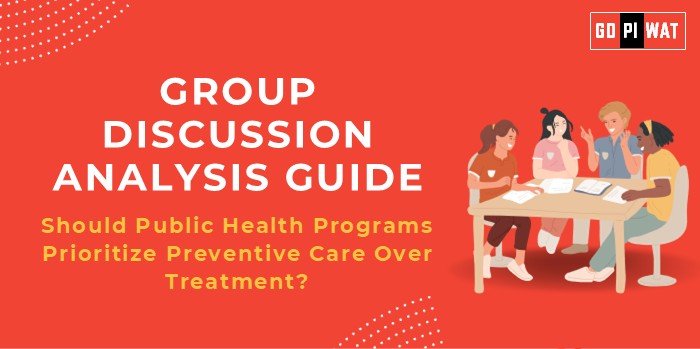📋 Group Discussion Analysis Guide: Should Public Health Programs Prioritize Preventive Care Over Treatment?
🌐 Introduction to the Topic
📖 Opening Context
Globally, healthcare systems face increasing challenges from rising costs, aging populations, and a surge in chronic diseases. This debate is vital as it examines how shifting resources can improve public health outcomes.
📜 Topic Background
Preventive care aims to avert diseases through early detection and lifestyle interventions, while treatment focuses on managing illnesses after they occur. In countries like India, where 60% of deaths are due to non-communicable diseases (NCDs), this discussion is highly relevant.
📊 Quick Facts and Key Statistics
- 💰 Global Healthcare Spending: Preventive care accounts for less than 3% of global health expenditure, despite evidence of cost-effectiveness.
- 📉 NCD Burden in India: NCDs contribute to 60% of deaths and are linked to lifestyle factors.
- 💵 Cost Savings: The CDC estimates that every $1 spent on immunization saves $10 in future healthcare costs.
- 📈 Life Expectancy Impact: Nations prioritizing prevention see increased life expectancy by 3-5 years.
🤝 Stakeholders and Their Roles
- 🏛️ Government: Sets policies, allocates budgets, and runs public health campaigns.
- 🏥 Healthcare Providers: Deliver both preventive and curative services, with an increasing focus on health education.
- 👥 Citizens: Responsible for adopting healthier lifestyles and participating in screening programs.
- 💼 Private Sector: Develops innovations like wearable health technology and promotes preventive services.
🏆 Achievements and Challenges
✨ Achievements
- 🩺 Reduced Mortality Rates: Vaccination campaigns have nearly eradicated polio globally.
- 📉 Chronic Disease Management: Early detection programs reduce diabetes-related complications by 20%.
- 🏋️ Awareness Campaigns: Initiatives like “Fit India Movement” have promoted healthier lifestyles.
⚠️ Challenges
- 💵 Funding Gaps: Only 5% of India’s health budget is allocated to prevention.
- 📢 Behavioral Barriers: Low participation rates in screenings due to awareness gaps.
- 🌍 Implementation Issues: Uneven access in rural and underserved areas.
🌎 Global Comparisons
- 🇫🇮 Success: Finland’s prevention-focused approach reduced heart disease deaths by 80%.
- 🇺🇸 Challenge: In the U.S., preventive care remains underfunded, leading to high healthcare costs.
📖 Case Study
📜 Kerala, India: Integrated healthcare programs emphasize lifestyle modifications, reducing cardiovascular incidents by 30%.
💡 Structured Arguments for Discussion
- 👍 Supporting Stance: “Preventive care reduces long-term healthcare costs and improves quality of life.”
- 👎 Opposing Stance: “Treatment remains essential as many diseases are unavoidable, even with prevention.”
- ⚖️ Balanced Perspective: “While prevention is vital for reducing incidence, treatment ensures comprehensive care.”
📈 Effective Discussion Approaches
🔑 Opening Approaches
- 📊 Statistical Start: “Did you know 60% of India’s deaths are preventable through lifestyle changes?”
- ❓ Question: “Can healthcare systems sustain rising costs without a prevention-first approach?”
🤔 Counter-Argument Handling
- 💡 “Acknowledging treatment’s necessity, we must still prioritize prevention for sustainable healthcare.”
🔍 Strategic Analysis of Strengths and Weaknesses
- 🌟 Strengths: Cost-effective, reduces disease burden.
- ⚠️ Weaknesses: Requires high initial investment, public compliance.
- 🚀 Opportunities: Technology, global partnerships.
- ⚡ Threats: Funding gaps, unequal access.
📚 Connecting with B-School Applications
- 🌐 Real-World Applications:
- 📋 Opportunities in healthcare management, such as designing wellness programs or public health campaigns.
- 💬 Sample Questions:
- 🧠 “How can technology enhance preventive care?”
- 📊 “What role does preventive care play in controlling healthcare costs?”
- 💡 Insights for Students: Public health strategies often intersect with finance, policy, and operations management.


